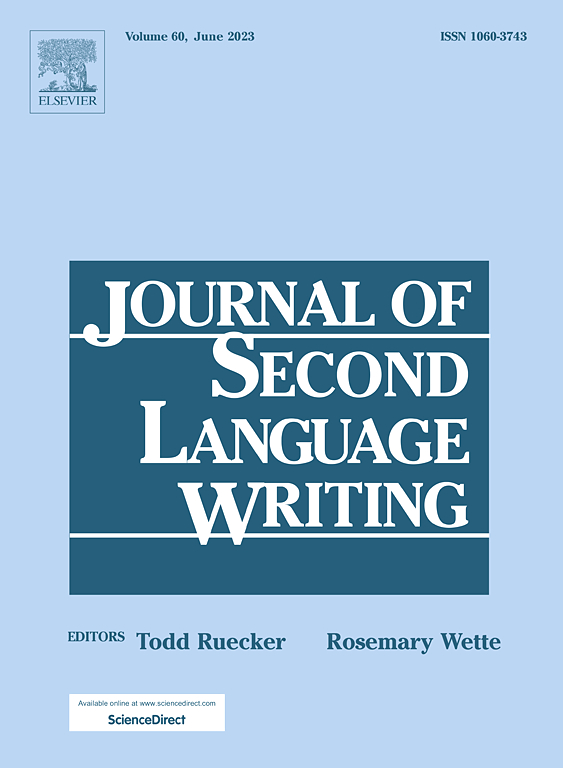EFL undergraduate students’ thinking and awareness in genre-based writing: Conceptualizing rhetorical moves and experimenting with linguistic knowledge
IF 4.5
1区 文学
Q1 LINGUISTICS
引用次数: 0
Abstract
In genre-based writing classes, students’ understanding and application of genre concepts vary based on their backgrounds and contexts. However, the thought processes underlying students’ genre-based writing remain understudied, particularly in undergraduate English for General Academic Purposes (EGAP) classes in English as a Foreign Language (EFL) settings. To address this gap, this ethnographic case study explores students’ thinking and awareness during genre-based academic essay writing in EGAP classes I taught at a university in Japan. Data were collected from students’ genre analysis of a sample text, drafts, annotated revised essays, written reflections, and recordings of writing conferences. The analysis reveals shifts in students’ reading stances during genre analysis, and their simplistic conceptualizations of perceived genre characteristics (e.g., rhetorical moves) and their experimentations with L2 linguistic knowledge based on rhetorical considerations (e.g., to express own thoughts in the text) during text construction. These findings highlight students’ evolving genre knowledge, genre and language needs, and potential for learning, as well as gaps in my genre-based teaching. Informed by critical reflection on my teaching practices, pedagogical implications emphasize the importance of promptly eliciting and addressing students’ emerging needs during text construction through explicit guidance and metacognitive scaffolding.
英语本科生体裁写作中的思维与意识:修辞动作的概念化与语言知识的实验
在体裁写作课上,学生对体裁概念的理解和应用会因背景和语境的不同而有所不同。然而,学生基于体裁的写作背后的思维过程仍未得到充分研究,特别是在英语作为外语(EFL)设置的本科通用学术英语(EGAP)课程中。为了解决这一差距,这个民族志案例研究探讨了我在日本一所大学教授的EGAP课程中,学生在基于体裁的学术论文写作过程中的思考和意识。数据收集自学生对样本文本的体裁分析、草稿、带注释的修改文章、书面反思和写作会议记录。分析揭示了学生在体裁分析过程中阅读立场的转变,以及他们在语篇构建过程中对体裁特征的简单概念化(如修辞动作)和基于修辞考虑(如在语篇中表达自己的想法)对二语语言知识的实验。这些发现突出了学生不断发展的体裁知识、体裁和语言需求、学习潜力,以及我基于体裁的教学中的差距。通过对我教学实践的批判性反思,教学暗示强调通过明确的指导和元认知支架在文本构建过程中迅速引出和解决学生新出现的需求的重要性。
本文章由计算机程序翻译,如有差异,请以英文原文为准。
求助全文
约1分钟内获得全文
求助全文
来源期刊

Journal of Second Language Writing
LINGUISTICS-
CiteScore
8.80
自引率
13.10%
发文量
50
审稿时长
59 days
期刊介绍:
The Journal of Second Language Writing is devoted to publishing theoretically grounded reports of research and discussions that represent a significant contribution to current understandings of central issues in second and foreign language writing and writing instruction. Some areas of interest are personal characteristics and attitudes of L2 writers, L2 writers'' composing processes, features of L2 writers'' texts, readers'' responses to L2 writing, assessment/evaluation of L2 writing, contexts (cultural, social, political, institutional) for L2 writing, and any other topic clearly relevant to L2 writing theory, research, or instruction.
 求助内容:
求助内容: 应助结果提醒方式:
应助结果提醒方式:


